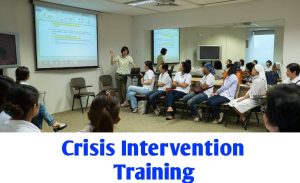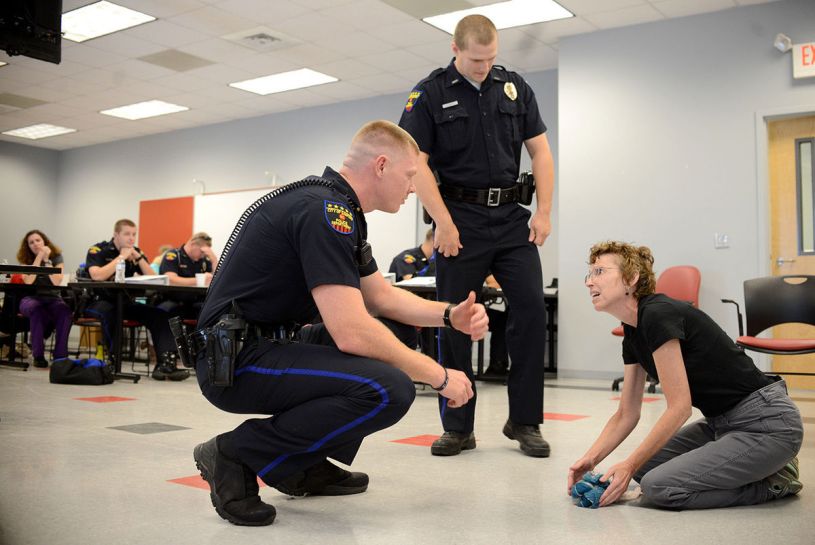If you work with people, there’s a good chance that you’ll eventually face a crisis. When this happens, it’s important to have the skills to help the person in need. Crisis intervention training can teach you how to do just that. In this article, we’ll talk about what crisis intervention is and what it entails. We’ll also talk about tips for helping people in crisis.
Contents
- 1 What Is A Crisis?
- 1.1 What Is The Best Way To Handle A Crisis?
- 1.2 What Is Crisis Intervention?
- 1.3 What Is Crisis Intervention Training?
- 1.4 Why Do We Need Crisis Intervention Training?
- 1.5 How Does Crisis Intervention Work?
- 1.6 How Can Crisis Intervention Training Help Me?
- 1.7 Objectives Of Crisis Intervention Training
- 1.8 Benefits Of Crisis Intervention Training Program
- 1.9 How To Find A Good Crisis Intervention Trainer?
- 2 Conclusion
- 3 A Word From Therapy Mantra
What Is A Crisis?

A crisis is a time when you need extra help to cope. It can be an emotional crisis, a physical health emergency, or a major life event. A crisis can make it hard to think clearly, take care of yourself, or solve problems.
What Is The Best Way To Handle A Crisis?
The best way to handle a crisis is by using a crisis intervention plan. This plan will help you stay calm and figure out the best way to solve the problem. some self-care steps include:
Listen And Remain Calm

When you are talking to a patient, it is important that you listen to them. You don’t want to make them feel judged or like they are being rushed. By remaining calm, you can help diffuse any tension that may be present and let them know it is okay and safe to talk about their problem.
Provide An Outlet
It is important to encourage patients to speak. Sometimes it can help to ask open-ended questions or reflect back on what you are hearing in order to clarify what the patient is saying. This way, they feel heard and understood which will help decrease their anxiety by feeling less alone with their problem.
Be Comforting

Sometimes when people are going through difficult times, they need someone to help them. If you think the person might be sad, just ask them if they want to talk. You don’t have to say anything important or give advice, but just being there is helpful. It’s also important not to get frustrated or overreact because that will make the person feel bad too.
Ask Questions That Will Assess The Situation
You should try to find out what is happening with them and if they need help. There are other things you can do, but these are some basics. It is important to stay calm and clear-headed. You should never judge them- for anything. Everyone has their own battles that are unseen to the outside world. People are often embarrassed to talk about what they are going through because they are afraid of being judged or how other people will react. But it is okay to talk about it. Simply saying, “It’s okay,” can make the patient feel much more at ease and take away their fear of speaking with you.
Be Prepared
If you are in public, with the patient or not, try to think of all possible emergency situations that could occur so you can be more prepared. If you are always prepared, there is less chance for anything unexpected to take place and panic will be less likely to ensure if these steps are followed.
What Is Crisis Intervention?
Crisis intervention is a type of counseling that helps people in crisis. The goal is to help the person who is going through a crisis and make them feel better. Then they can live a healthy life.
What Is Crisis Intervention Training?
Crisis intervention training is a program that helps people learn how to respond to and help those in crisis. The goal of the program is to provide people with the skills they need to safely and effectively intervene in a crisis situation.
Why Do We Need Crisis Intervention Training?

Every day, people face crises. It’s important that we have people who are trained to help them in these situations. When you know how to respond to a crisis, you can make a difference for someone who is going through a difficult time. You may be able to prevent things from getting worse or even save someone’s life.
How Does Crisis Intervention Work?
- The first step in crisis intervention is to assess the situation. This means finding out what is happening and how serious it is. The counselor will also ask about the person’s history, including any mental health issues or previous crises.
- Next, the counselor will work with the person to come up with a plan. There are many ways to deal with stress. This includes talking about what is bothering you, getting help from family or friends, or seeking professional care.
- Finally, the counselor will follow up with the person after the crisis has passed. This is important to make sure that the person is doing okay and didn’t experience any long-term effects from the crisis.
Crisis intervention training can help people learn how to respond to and help those in crisis. When you know how to intervene in a crisis situation, you can make a difference for someone who is going through a difficult time. You may be able to prevent things from getting worse or even save someone’s life.
How Can Crisis Intervention Training Help Me?

Crisis intervention training can help you learn how to:
- Assess the situation: This means finding out what is happening and how serious it is. The counselor will also ask about the person’s history, including any mental health issues or previous crises.
- Come up with a plan: There are many ways to deal with stress. This includes talking about what is bothering you, getting help from family or friends, or seeking professional care.
- Intervene in a crisis situation safely and effectively: The goal of the program is to provide people with the skills they need to safely and effectively intervene in a crisis situation.
- Follow up with the person after the crisis has passed: This is important to make sure that the person is doing okay and didn’t experience any long-term effects from the crisis.
Crisis intervention training can help you learn how to respond to and help those in crisis. When you know how to intervene in a crisis situation, you can make a difference for someone who is going through a difficult time. You may be able to prevent things from getting worse or even save someone’s life.
If you are interested in learning more about crisis intervention training, please visit our website or contact us for more information.
If you’re interested in learning more about crisis intervention training, contact your local mental health agency or counseling center. They may offer classes or workshops on this topic. You can also find information online. There are many resources available to help you get started.
Objectives Of Crisis Intervention Training

Following are the goals and objectives of Crisis Intervention Training. To:
- Provide participants with an understanding of the nature and dynamics of crisis situations:
- Provide participants with an understanding of their own reactions to crisis situations and how to manage them;
- Help participants develop effective communication and problem-solving skills for use with people in crisis;
- Assist participants in understanding the needs of people who are experiencing a mental health or substance abuse crisis;
- Provide information on community resources that may be helpful to people in crisis.
- Enhance participants’ skills in assessing, intervening, and referring individuals in crisis.
- Provide a forum for exchanging information and ideas about crisis intervention.
The goals of Crisis Intervention Training are important, but they would not be possible without the objectives. Our objectives are what we hope to achieve as trainers. These goals will help people affected by a mental health or substance abuse crisis. By providing individuals with the skillset needed to communicate effectively and problem solve, we can help them through these difficult times.
The objectives of Crisis Intervention Training also provide a foundation for trainers to build upon. They allow us to create a training program that is tailored specifically to the needs and wants of the group in attendance. This not only makes the experience more beneficial for participants but also allows us to better meet their needs. Lastly, exchanging information and ideas about crisis intervention is essential in order to continue improving our skills as trainers.
By working together, we can develop new and innovative ways of helping people affected by a mental health or substance abuse crisis.
Benefits Of Crisis Intervention Training Program
The benefits of a Crisis Intervention Training program are vast and far-reaching. In addition to the goals and objectives listed above, a well-designed CIT program can help to achieve the following:
- Reduce the number of people with mental illness who come into contact with law enforcement;
- Reduce the number of people with mental illness in jails and prisons;
- Prevent tragedies, such as suicides or homicides, that may occur when people in crisis do not receive appropriate help;
- Improve communication between law enforcement officers and individuals with mental illness or their families;
- Increase public understanding of mental illness and substance abuse disorders.
A well-run Crisis Intervention Training program can have a profound impact on both individuals affected by a mental health or substance abuse crisis and the community at large. By providing people with the skills needed to manage their own reactions and communicate effectively, we can help them get through these difficult times. Additionally, by reducing the number of people with mental illness who come into contact with law enforcement, we can prevent tragedies from occurring. CIT programs are essential in our fight to improve the lives of those affected by a mental health or substance abuse crisis.
How To Find A Good Crisis Intervention Trainer?

When looking for a good Crisis Intervention Trainer, it is important to consider the following:
- What are the trainer’s qualifications?
- Does the trainer have experience in working with people who are experiencing a mental health or substance abuse crisis?
- Is the trainer familiar with local resources that may be helpful to people in crisis?
- How well does the trainer know the goals and objectives of Crisis Intervention Training?
- Is the training program tailored specifically to meet the needs of participants?
The answers to these questions can help you determine if a particular trainer is right for your organization. Remember, when choosing a Crisis Intervention Trainer, it is important to select someone who is qualified and experienced in working with people affected by a mental health or substance abuse crisis.
Conclusion
The crisis intervention training course provides the skills you need to respond effectively in a variety of situations. It includes scenarios and step-by-step instructions for communicating with someone who is experiencing a mental health or substance abuse crisis, as well as information about how to identify when an individual may be at risk for suicide. This comprehensive course will help you provide compassionate care that goes beyond symptom management by exploring underlying causes and examining ways to build resilience in vulnerable populations.
A Word From Therapy Mantra
Your mental health — Your psychological, emotional, and social well-being — has an impact on every aspect of your life. Positive mental health essentially allows you to effectively deal with life’s everyday challenges.
At TherapyMantra, we have a team of therapists who provide affordable online therapy to assist you with issues such as depression, anxiety, stress, workplace Issues, addiction, relationship, OCD, LGBTQ, and PTSD. You can book a free therapy or download our free Android or iOS app.


